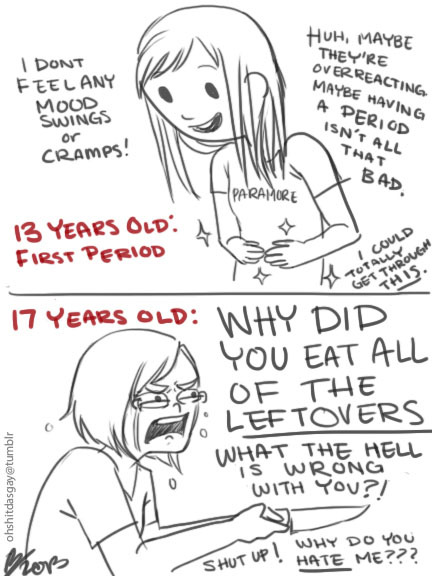Amenorrhea or missed periods is probably one of the most common problems associated with restrictive eating and weight loss. Read: you do not have to have an eating disorder to be experiencing weight-related amenorrhea and you don't have to be experiencing amenorrhea to be at a much too low body weight. In fact, if you are on birth control, you will continue getting a "false" period hormonally induced by the pill itself. Your period should not be indicative that you are "not sick enough." There is no such thing as "not sick enough."
Your menstrual cycle is actually an extremely complicated continuous process and the actual bleeding is only a small portion of it that results because your cycle didn't accomplish its primary goal: you getting pregnant. But that's okay, because we don't want to get pregnant every month anyways!
Because of this continuous cycle though, which is regulated by a very complicated set of interconnected hormone balance, menstruating extremely taxing to your body and requires a lot of energy. Fortunately for your body's survival instincts, reproduction isn't a completely necessary survival function and in fact, nature does not want you to reproduce when there is famine. After all, how are you going to feed your offspring when you can't even feed yourself? Keep in mind that your body didn't evolve for the 21st century where food is plentiful and we just choose not to eat; when it isn't fed, your body thinks that it is because there is no food around.
Shutting down the reproduction process becomes the perfect way to preserve precious energy. Your body stops releasing eggs, you stop having your period. In general, women need about 10% body fat to have regular periods. Therefore, it is extremely common for models, athletes, and female body builders to lose their periods as well.
But wait, there is more! When you restrict your eating patterns, whether it be strictly calories or certain food groups, you are missing out on crucial vitamins, minerals, and macronutrients that are needed for your body to properly reproduce. Many girls turn to low fat diets, vegan/vegetarianism, or cut out red meats, which put them at risk for vitamin B12, folate, and iron decencies and thereby anemia. When your body doesn't have enough red blood cells, it won't want to release extra ones every month when it doesn't have to.
In another aspect, many of your hormones, especially the ones that control reproduction, are made from fats (specifically cholesterol) and are highly regulated on extremely complicated and interrelated feedback loops. That means that the levels of one hormone will have an effect on several other hormones in your body. When you don't eat enough fats and cholesterol, which is common in restrictive or vegan/vegetarian diets, your body doesn't have the essential building blocks to make hormones, which throws many body functions out of whack and feeds into a vicious cycle; hormone imbalance causes more hormone imbalance. It's like trying to build when you don't have basic bricks and mortar - it just won't happen! I remember getting blood tests done during the worst of my eating disorder and I essentially had no thyroid or pituitary hormones, four months into MM and real recovery, my hormone levels were at the minimally normal levels again. Food heals, guys. Food heals.
As for getting your period back, the most essential thing is to eat enough food and gain weight! Remember that you need to have at LEAST 10% body fat for regular periods, but most women function best at around 20-25%. Just eating maintenance calories will not cut it because during restrictive eating, your metabolism slows down so that it can function in a starvation-level of calories. You have to convince your body that it is no longer going to starve by feeding it excess food before it trusts you again and starts reproduction processes.
Many girls, myself included, have found that high fat foods and in particular full fat dairy products have also helped in recovering from amenorrhea. Not only does it contain necessary fats, vitamins, and cholesterol, the small amount of growth hormones found in dairy can help your hormone levels normalize. During recovery (and even now) I made it an effort to eat full fat yogurt and milk every single day. I am lactose intolerant, but the bacteria cultures in yogurt helps me digest the lactose that I can't (most lactose intolerant people can have yogurt) and I used lactose-free milk. Other foods I recommend are ice cream, nuts, oils, red meats, and peanut butter.
Most people are able to recover from restriction-induced amenorrhea, but it takes time. Like I mentioned before, your menstrual cycle is highly regulated by an extremely complicated hormone system which takes time to heal. Trust your body girls, treat it well, and allow it to heal itself. The more you eat and allow your body to rest, the easier and quicker recovery will come.






